Currently, we have the following sites up-and-running:
- Sustaining DH: NEH Institute for Advanced Topics in the Digital Humanities (https://sites.haa.pitt.edu/sustainabilityinstitute/)
- This website provides information about a NEH-Funded Institute on Digital Sustainability that consists of a series of workshops that will be occurring throughout the United States in 2018-2019. These workshops are organized and facilitated by a team of researchers from the University of Pittsburgh, and will provide background information and a detailed scaffolding for exploring approaches to the long term sustainability of digital humanities projects.
- Decomposing Bodies (http://sites.haa.pitt.edu/db)
- This site is the hub for information about the digital humanities project Decomposing Bodies that concerns the system of Bertillonnage and its relationship to American penal history and the history of information management. It is currently suspended for revision.
- The Socio-Technical Sustainability Roadmap (https://sites.haa.pitt.edu/sustainabilityroadmap/)
- This site is home to the Socio-Technical Sustainability Roadmap (the “Roadmap” or the STSR). It is a module-based workshop intended to help digital project creators approach the seemingly daunting task of sustaining web-based, user-facing, digital humanities projects over time.
- Network Analysis + Digital Art History: A Getty Advanced Workshop (https://sites.haa.pitt.edu/na-dah/)
- This site is the hub for the large-scale Getty Advanced Workshop focused on the intersection between the fields of network analysis and digital art history. It will take place, in a series of events, between July 2019 and July 2020 at the University of Pittsburgh.
- Itinera: A Guide (https://sites.haa.pitt.edu/itineraguide/)
- This site is the hub for the companion guide to Itinera, a database and visualization tool used to track the movement of 18th- and 19th-century people and objects in the spirit of the Grand Tour. This companion guide provides information on how its back-end users interpret the muddy, historical information from the primary source and input it into the straightforward forms in the back-end of Collective Access, the digital platform that enables it. The guide demonstrates how to navigate the complexities of Itinera for both the user and non-user.
- Raceing the Museum (http://sites.haa.pitt.edu/raceingthemuseum/)
- This site serves as the hub for the work initiated by a Mellon-funded workshop that took place in Pittsburgh the week of June 9-13, 2016. The participants are working on questions such as: How have museums, as collections and as institutions, created, supported, or challenged constructions of race and racial identity? How are museums and their objects implicated in the history of slavery, indigenous peoples, and race relations? How have museums represented and interpreted these issues? How can and should their collections tell different stories?
- Ubiquitous Computing and Surveillance Culture (http://sites.haa.pitt.edu/ubicomp)
- This site is the hub for information about the “Ubiquitous Computing and Surveillance Culture” workshop that took place on April 1, 2016 in the Humanities Center at the University of Pittsburgh.
- Computational Visual Aesthetics (http://sites.haa.pitt.edu/cva)
- This site is the hub for information about the “Computational Visual Aesthetics” workshop that took place on November 13, 2015 at the School of Information Sciences at the University of Pittsburgh.
- Network Ontologies in the Early Modern World (http://networkontologies.org)
- This site is the hub for information about the “Network Ontologies” workshop, held at the University of Pittsburgh on November 21-22, 2014. Aided by the participation of experts in linked data and information systems, the workshop was, and continues to be, an exercise in what Bruno Latour calls “practical ontology.”
